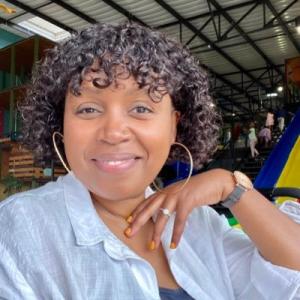African Girls Can Code Initiative empowers young women with skills for a changing world
01 July 2025
Bridging the Gender Gap in STEM: Equipping Girls with Digital Skills for a Changing World.
Following three successful coding and robotics bootcamps in 2024 and 2023, the African Girls Can Code Initiative (AGCCI) returns in 2025 to empower Grade 11 girls. From 4–14 July, 100 high school learners from public schools in all nine provinces will gather in Johannesburg for hands-on training in coding, robotics, and artificial intelligence. This is in line with the theme for this National Youth Month: “Skills for the changing world – Empowering youth for meaningful economic participation”. In South Africa, AGCCI is implemented through a partnership between UN Women South Africa Multi-Country Office, the Department of Basic Education, with support from Siemens and the Belgian government.
Despite making up over half of all university graduates worldwide, women remain underrepresented in STEM(Science, Technology, Engineering and Mathematics) fields, accounting for only 35% of STEM graduates globally and about 30% of researchers in Sub-Saharan Africa, according to the UN Women and United Nations Department of Economic and Social Affairs Gender Snapshot 2024. Research reveals that in South Africa, less than one-third of female tertiary students graduate from STEM programs, and only 13% of digital-related graduates are women. The STEM gender gap starts early, with fewer girls choosing these subjects. Although more girls than boys wrote Grade 12 maths and physical science exams in 2021, boys outperformed them. This persistent educational gap limits girls’ career opportunities and contributes to poverty, inequality, and unemployment in South Africa.
“Achieving gender equality demands that every young woman and girl be equipped with the right tools and have an equal chance at seizing the opportunities presented by digital advancement. African Girls Can Code Initiative has moved our efforts from just talking about bringing more women to the forefront of STEM to taking impactful steps to make it a reality, and it will only get better,” said Aleta Miller, UN Women Representative, South Africa Multi-Country Office.
The 2025 bootcamp for high school girls programme will build on the South African Ministry of Basic Education’s new Coding and Robotics Curriculum to equip Grade 11 girls with essential digital skills. This year’s theme, Youth for Global Progress: Uniting for Solidarity, Championing Equality, Driving Sustainability, emphasises preparing young women to think critically, solve problems, and thrive creatively in a rapidly evolving digital world. Participants will engage in hands-on coding, robotics, and digital literacy activities designed to boost their confidence and open pathways into STEM careers. In June 2024, the South African AGCCI cohort expanded to include young women in TVETs, equipping them with digital and business skills. They learned coding, e-commerce, digital currencies, and how to use online platforms to launch and grow their own businesses. Many walked away not only with new skills, but with renewed confidence in their potential to lead, innovate, and create change in their communities and beyond. The impact is already evident:
Victoria Phago’s perspective on IT careers changed when she joined AGCCI. “The programme revealed a fuller range of IT opportunities. I used to think IT was only about being a programmer or software developer, but now I see I can be innovative, design my own things, and even become an entrepreneur,” she said. Victoria is an Information Communication Technology (ICT) student at Tshwane North TVET College who was part of the AGGCI TVET coding camp in 2024.
“Being part of the African Girls Can Code Initiative (AGCCI) was a turning point for me. AGCCI not only introduced me to the world of technology but also empowered me to take control of my future. Through this initiative, I realised the vast potential of technology in shaping our world and decided to pivot my career goals towards cybersecurity and information technology,” Bianca Moraka, AGGCI alumna.
The AGCCI programme introduces students to computer science and next-generation technologies, user interface/user experience, website development, mobile applications development, robotics, and programming. The young participants also learn about gender equality and women's empowerment and what inclusion in the ICT sector will mean for progress and diversity.
About African Girls Can Code Initiative In response to the growing need for inclusion in STEM and gender equality across the African continent, UN Women and the African Union Commission (AUC), in partnership with the International Telecommunication Union (ITU), launched the African Girls Can Code Initiative (AGCCI) in 2018.The programme aims to train and empower a minimum of 2000 girls aged 17 to 25 across Africa to become computer programmers, creators, and designers and more. The South African cohort is part of a larger group of girls on the continent who have received similar training in Kenya, Rwanda, Uganda, Tanzania,
Mozambique, Burundi, Mali, Niger, DRC, and Senegal. and more.
About UN Women UN Women is the global champion for gender equality, working to develop and uphold standards and create an environment in which every woman and girl can exercise her human rights and live up to her full potential. We are trusted partners for advocates and decision-makers from all walks of life and a leader in the effort to achieve gender equality. To learn more about UN Women’s work on the African continent: https://africa.unwomen.org/en.
To attend the graduation on 11 July 2025, to cover one of the coding camp days in Johannesburg, or for media interviews, please contact: Maphuti Mahlaba Communications Analyst – UN Women South Africa Multi-Country Office maphuti.mahlaba@unwomen.org +27 65 742 4459









